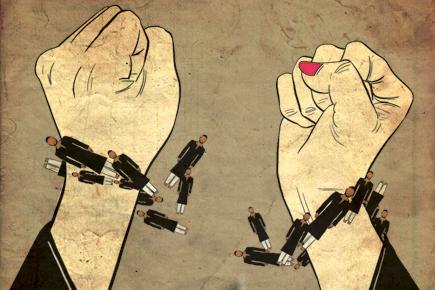India is finally getting to Terminal T3, calling for an end to triple talaaq -T3 - or instant divorce by Muslim men


Illustration/Uday Mohite
ADVERTISEMENT
 India is finally getting to Terminal T3, calling for an end to triple talaaq -T3 - or instant divorce by Muslim men. Till now, a Muslim man could divorce his wife faster than he could make noodles, which takes two whole minutes. The narrow 3:2 win by a single vote of the Supreme Court 'manel', that gave its verdict this week, was significant. After 70 years of Independence, the Supreme Court has just one woman judge, and she was nowhere on the panel concerning Muslim women's rights. Most telling was the minority view of Chief Justice JS Khehar and Justice S Abdul Nazeer: "Such a call of conscience, as the petitioners desire us to accept, may well have a cascading effect... We have to be guarded, lest we find our conscience traversing into every nook and corner of religious practices, and 'personal law'." With full respect to their lordships, if I understood them correctly, they were worried what could happen if they followed their conscience fully. Amazing.
India is finally getting to Terminal T3, calling for an end to triple talaaq -T3 - or instant divorce by Muslim men. Till now, a Muslim man could divorce his wife faster than he could make noodles, which takes two whole minutes. The narrow 3:2 win by a single vote of the Supreme Court 'manel', that gave its verdict this week, was significant. After 70 years of Independence, the Supreme Court has just one woman judge, and she was nowhere on the panel concerning Muslim women's rights. Most telling was the minority view of Chief Justice JS Khehar and Justice S Abdul Nazeer: "Such a call of conscience, as the petitioners desire us to accept, may well have a cascading effect... We have to be guarded, lest we find our conscience traversing into every nook and corner of religious practices, and 'personal law'." With full respect to their lordships, if I understood them correctly, they were worried what could happen if they followed their conscience fully. Amazing.
So, this is a hard won, landmark ruling, of course. But, this is only the beginning, and now, laws need to be framed accordingly and implemented. Meanwhile, let's consider the implications of the verdict. Say, I'm married to a skunk who, while I'm visiting my mum with the children, sends me a T3 WhatsApp message. Now, in the light of the Supreme Court ruling, T3 is illegal. So, guess what, I am victorious because now I can continue living with the skunk, who is unable to divorce me, for the rest of my life. What joy. This is not very far from a situation where a teenager in Bareilly, UP, who had been raped, was pressured into marrying her rapist last month, amid parental concerns as to "who will marry her anyway". India finds many ingenious ways to ensure that women stay hitched to assorted skunks.
While all this is legalese, it is fascinating to know what's also happening on ground. In Deepa Dhanraj's inspiring documentary Invoking Justice, made in 2011, she records the triumphs and tribulations of an all-women jamaat or women's council, in Pudukottai in Tamil Nadu. They were fed up with all-male jamaats held in mosques, whose patriarchal and unjust interpretations of the shariat - especially in personal and family law, concerning the murder of and violence against women, triple talaaq, dowry and discrimination - never even allowed women to be present for the hearing of their own cases. So, Sharifa Khanam founded a women's jamaat in 2004, that has dispensed justice according to the shariat, but with more honesty and compassion, in over 8,000 cases. It is a revolutionary step for Muslim women in securing justice. Says a woman member, "I was a second wife. I divorced my husband and told him to get lost. How long could I put up with the torture? For me, sex is like a spicy pickle that accompanies a meal. Love is essential, like food. But he wanted only pickle." Later, the women's jamaat also grants Amarunissa a divorce after her husband torments her and demands that she find him a new, 18-year-old bride. Some women are lucky enough to de-skunk themselves.
Meenakshi Shedde is South Asia Consultant to Berlin Film Festival, award-winning critic, curator to festivals worldwide and journalist. Reach her at meenakshishedde@gmail.com
 Subscribe today by clicking the link and stay updated with the latest news!" Click here!
Subscribe today by clicking the link and stay updated with the latest news!" Click here!







